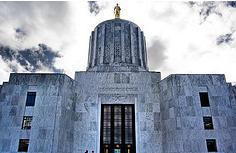 HB 4101: Oregon’s Timber tax
HB 4101: Oregon’s Timber tax
By Oregon Tax News
The current Legislative Session features a bill (Hb 4101) that seeks to punish victims of previous environmental policies problems with additional taxes. HB 4101 creates a severance tax on timber production that would go to fund county government as well as distribute back to timber mills who paid the tax through a tax credit for milling logs. The HB 4101 tax is a severance tax on Oregon timber at a rate of $15 per thousand feet, board measure.
Over the past 30 years, environmentalists have aggressively pushed policies that have essentially shut down the use of Oregon’s forestlands for logging. While small amounts of timber still are harvested on private lands, logging on federal and state-owned lands in Oregon has virtually ended. Not surprisingly, these policies have led to epic unemployment in Oregon’s rural communities, where logging and other timber-related jobs were the mainstays of healthy local economies. Double-digit unemployment is common in formerly timber-dependent counties in Oregon, and even this doesn’t account for everyone who has lost a job and has given up looking.
Adding to the problem is increasing federal reluctance to continue the “Payments in Lieu of Taxes” (PILT) program. Since federal forestlands cannot be assessed local property tax, the federal government for decades made PILT payments instead. Before 1990, these payments had at least some tie to use of the federal government’s property for timber production. These payments also helped to fund crucial local programs like schools and roads. Since there is no longer any meaningful timber production from federal lands, Congress now sees PILT as more of a welfare program than an exchange of federal support for economic development. Each Congress, Oregon’s federal delegation (the majority of which has fought hard to restrict timber production from federal, state and private property) is forced to re-convince their colleagues to continue some form of PILT. Its days are clearly numbered.
Now the politicians are facing the truth they were warned about when the Spotted Owl controversy first broke across the State 35 years ago. Local governments in rural Oregon are facing tremendous financial problems caused by a combination of a lack of fiscal discipline, exploding costs for PERS and health insurance and the twin body blows of lowered PILT payments and dramatic reduction in employment within their jurisdictions.
There have been two unsurprising potential “solutions” for this local government funding crisis. Governor Kitzhaber suggested allowing local jurisdictions be given authority to impose local income taxes and Representatives Buckley and Holvey have introduced a bill (HB 4101) in the current Legislative Session that would impose additional taxes on timber production. These taxes – called “severance” taxes – would be applied to all timber harvested in Oregon and would join other severance taxes and so-called “privilege” taxes that apply to forestland in the State. The rate would be $15 per thousand board feet. No fiscal impact or revenue statements have yet been produced by the Legislative offices responsible.
A total of six percent of the revenue raised by this new severance tax would be siphoned off to the Oregon Department of Revenue and the Oregon Department of Forestry to administer the tax (although there’s no evidence as yet of any increased costs for either Agency). The remaining money would be placed in a “suspension account” within the State Treasurer’s office. These funds – once any refunds or other costs are paid – will be re-distributed to Oregon counties in roughly the same proportion as the taxes were generated based on timber cutting in each county.
In some respects HB 4101 is counterintuitive. It is likely to be opposed by environmental groups, as it might encourage both the Legislature and local governments to seek additional timber harvest to funnel money to State Departments and local governments. The Legislative Majority, firmly in league with the environmental movement, would be working against one of its strongest supporters in doing so.
On the other hand HB 4101 is an admission of the complete failure of forest policy implemented by in Oregon and at the federal level. These policies are directly responsible for placing many Oregon local governments at the brink of fiscal insolvency, unable even to pay for such basics as law enforcement and road repair. This legislation seeks to further increase taxes on the very people the Legislature’s forest policies have sought to destroy. The bill will further reduce current employment in the timber industry, and the profitability of all timber harvest in Oregon (thereby reducing tax revenues to the State and local governments), as well as increasing the price of timber products to the consumer (further decreasing economic activity and tax revenues).
HB 4101 risks deepening the fiscal crisis in Oregon’s rural counties. What is not being discussed are policies that allow for the sustainable harvest of all forestlands in Oregon, put people back to work in the woods, and thereby increase the revenues available to both the State and local governments to accomplish the work the public needs them to do.
Disclaimer: Articles featured on Oregon Report are the creation, responsibility and opinion of the authoring individual or organization which is featured at the top of every article.

